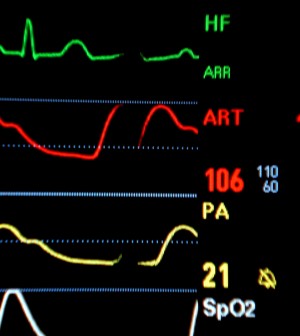- Could Your Grocery Store Meat Be Causing Recurring UTIs?
- Are You Making This Expensive Thermostat Error This Winter?
- Recognizing the Signs of Hypothyroidism
- 10 Strategies to Overcome Insomnia
- Could Artificial Sweeteners Be Aging the Brain Faster?
- Techniques for Soothing Your Nervous System
- Does the Water in Your House Smell Funny? Here’s Why
- Can a Daily Dose of Apple Cider Vinegar Actually Aid Weight Loss?
- 6 Health Beverages That Can Actually Spike Your Blood Sugar
- Treatment Options for Social Anxiety Disorder
Treating Early Symptoms of MS May Extend Time to Diagnosis

Starting multiple sclerosis (MS) treatment when the first signs of the disabling disease appear may delay the period before the condition is definitively diagnosed or a relapse occurs, new long-term research indicates.
Researchers found that people who received early treatment for symptoms consistent with the onset of MS were one-third less likely to eventually be diagnosed with MS than participants whose treatment was delayed. Those symptoms include numbness, or vision or balance problems.
Patients in the early treatment group also experienced a 19 percent lower annual relapse rate, the study found.
“The surprise is that after 11 years, we were still able to detect a difference favoring early treatment, although the delay in starting treatment in the delayed treatment group was only 1.5 years on average,” said study author Dr. Ludwig Kappos. He’s a professor and chair of neurology at University Hospital and University of Basel, Switzerland.
“The most astonishing observation was that relapse rates remained lower in most of the years after both groups had equal access to treatment,” Kappos added.
MS symptoms range from muscle weakness, dizziness and thinking difficulties, to bladder and bowel problems. These symptoms can vary from person to person. And symptoms can be mild or severe, according to the National Multiple Sclerosis Society.
MS affects about 2.3 million people worldwide, the society says.
Usually, about 85 percent of those experiencing a first episode of symptoms that suggest MS will eventually be diagnosed with the disease, the study authors said. This first episode is called clinically isolated syndrome.
For the study, Kappos and colleagues randomly assigned 468 people with early MS symptoms to either receive early treatment or an inactive placebo. People in the treatment group received interferon beta-1b, a first-generation MS drug that suppresses the immune system, the study authors said.
Funding for the study was provided by Bayer Healthcare Pharmaceuticals. Bayer makes Betaseron, a brand version of the drug used in this study.
After two years, or sooner if someone was officially diagnosed with MS, those taking the placebo could switch to the study drug or another drug. After 11 years, researchers re-evaluated the nearly 300 people still participating. There were 167 from the early treatment group and 111 from the delayed treatment group.
Those who received early treatment were 33 percent less likely to be diagnosed with MS than those in the delayed treatment group. Participants taking early treatment also experienced twice the average time — 1,888 days compared to 931 days — before their first MS relapse, the findings showed.
Kappos said the findings suggest that MS should be treated as soon as symptoms first appear. But he added that other disorders need to be excluded before starting treatment. And, he said, the treatment needs to be well-tolerated.
After 11 years of follow-up, the researchers found no difference between the two groups of participants in overall disability levels. In addition, MRI scans detected no evidence of any differences between the groups in the damage caused by MS.
Still, Kappos said, “it was reassuring to see that little progression occurred in both treatment groups over these 11 years. For me, this underlines that — although the [results] are better with a very early intervention — the window of opportunity remains open for some time.”
Brian Healy, an assistant professor of neurology at Harvard Medical School in Boston, praised the research. But further studies are still needed to understand the best approaches for treating MS patients over the course of the disease, he noted.
“This is a valuable study because most clinical trials only follow patients for a short time, even though MS has a long disease course,” said Healy, who authored an editorial accompanying the study.
There are many new disease-modifying therapies now available for MS. Kappos and Healy agreed that new long-term research should compare patient outcomes using these medications to see what’s the best overall treatment approach.
“A burning, but not easy to resolve, question is if these [study] results … would be further improved by treating as early with one of the more recently developed treatments that have shown more [effectiveness] in established, relapsing MS,” Kappos said.
The study was published online Aug. 10 in the journal Neurology.
More information
The National Multiple Sclerosis Society has more about MS symptoms.
Source: HealthDay
Copyright © 2026 HealthDay. All rights reserved.










